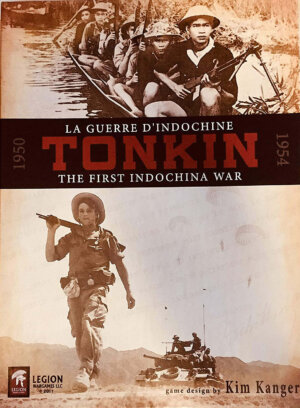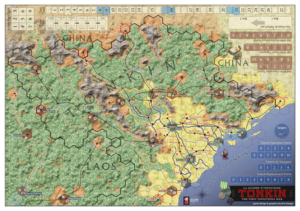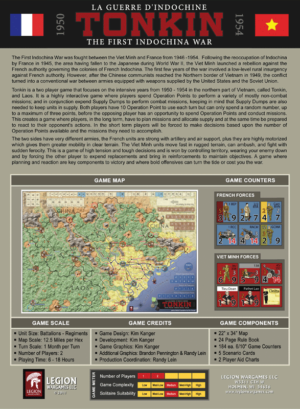
Publisher: Legion Wargames
Designer: Kim Kanger
Artists: Kim Kanger, Randy Lein, and Brandon Pennington
Year: 2012
Genre: Hex and counter Indochinese wargame set in Vietnam
Players: Two players
Ages: 14+
Playing Time: 6-18 Hours
MSRP: $55.00
Tonkin: The First Indochina War 1950 – 1954 puts two players head to head as the Viet Minh and Pathet Lao as they fight their revolt against the occupying French forces in Vietnam. Although the war began in 1946, the fighting intensified in 1950 and continued to escalate through to the conclusion. The largest clashes took place in the northern part of Vietnam and Laos in the area known as Tonkin which is where this title is set.
Tonkin provides six scenarios, of varying length including a campaign, beginning with a tutorial leading through to the siege of Dien Bien Phu. While the game provides some very interesting challenges for each player the two forces play much differently and not understanding your strengths, as well as the weaknesses of your enemy, can lead to a very trying time. While sticking with the game will lead you to appreciate a fine design you might find grasping the mechanics and putting them into action effectively, within the framework of a successful strategy, takes some getting used to.

Each scenario is played out through a set number of turns and each game turn is broken into six phases.
Replacement/Reinforcement – Based on the reinforcement chart The Viet Minh must have a certain number of Victory Points in order to bring in reinforcements while the French must spend VPs if they want to bring in their reinforcements immediately or can decide to wait until later turns to bring them in at no cost. Each side also receives replacement points in which to rebuild eliminated units as well as supply dumps which will be used during the Operations Phase.
Movement (Viet Minh and French) – Each side will move units by various means (air, river, ship, transport, truck or foot)and each side also possess some special units as well which allow unique movement. The VM player moves their units first followed by the French. Players also need to do their best to keep their forces in supply while attempting to cut the enemy’s supply lines.
Attrition – Units out of supply must lose a step and even can be eliminated if down to a single step.

Supply Check – units check to see if they are in supply. If not in supply they are marked with an appropriate chit and run the risk of losing a step in the following turn’s Attrition Phase.
Once the final turn of the scenario has been completed you’ll actually play three more phases before calculating victory. Each side performs one last movement phase and those are followed up with an Attrition Phase. After that VPs are calculated; Victory Points swing back and forth on a scale of 0-100 and the closer to 100 the better for the French and the closer to 0 (or even less than zero) the better for the VM. VPs are earned by capturing enemy Victory Point hexes.
As I mentioned, Tonkin offers a lot of challenges for each player. Although the game is rated by Legion Wargames as medium complexity, I’d personally put it a notch higher at medium to high as there are a lot of small details which can be overlooked. It took a few plays of the tutorial scenario before things started to click for myself and a detailed example of play for a turn or two in the ruels would have been a welcome addition. This isn’t to say Tonkin is overly complex, just different and deserving of extra attention to understand.

The Viet Minh, on the other hand, hold a great advantage in moving through the jungle to set up ambushes but have to have a certain VP level to bring in reinforcements. The fact they are the indigenous people fighting on their home turf is reflected well but if the French keep the VP track in their advantage things can be very tight for the VM. Effectively attacking weaker enemy units can cause the French to spend valuable VPs in order to bring in reinforcements and this goes a long way toward victory.
Regardless of what side you take on you’ll find planning and careful use of your supply dumps is essential if you want a shot at winning the game. Neither side can stay on the offensive for very long and if you use up supply faster than you can replace it you’ll find yourself on the short end of the stick very quickly. Overall, Tonkin is an impressive game although not for the casual wargamer not only due to the trickiness of the rules but more so because most of the scenarios will take longer than an afternoon or evening to complete.













